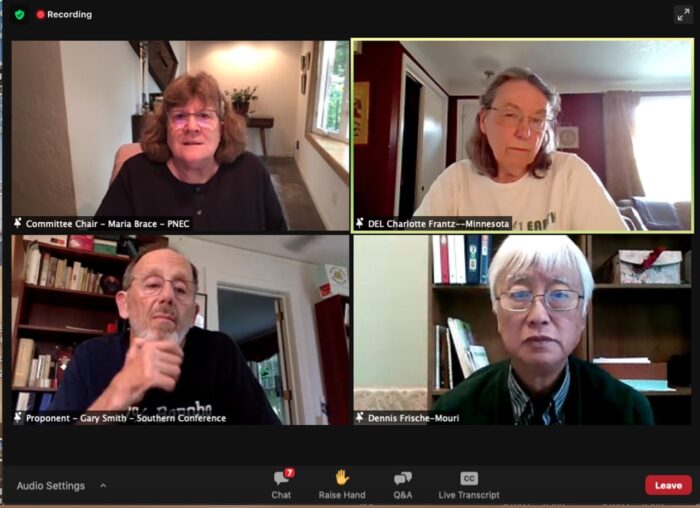Synod delegates affirm resolution calling for cash bail system reform
“The cash bail bond system doesn’t keep people accused of crimes in jail; it keeps poor people accused of crimes in jail.”
That assertion is posted on the website of Community United Church of Christ, Raleigh, N.C., along with resources for education and advocacy. The church and other members of the UCC’s Southern Conference engaged a process for reforming the cash bail bond system, wrote a resolution supporting it and brought it before the 2021 General Synod.
The process that followed shed light on the issue — and is an example of the kind of wordsmithing that sometimes happens in Synod committees and floor debates.
‘We need to fight for them’
“What did he say?” a defendant asks his lawyer in a video produced by Burning Coal Theater Company in collaboration with Community UCC. The attorney answers, “The cash bail. That means if you don’t pay, you have to stay.” Defendant Brown replies, “What about my job? They’ll fire me.”
Early in the process, as a committee of delegates reviewed the resolution, Frances Munro, an attorney and Synod delegate from Southern New England, said, “The video shows that eviction is a very real situation. They really don’t accomplish anything by making people stay in jail if they don’t make bail.”
Another delegate on the committee spoke up. Mandy Muschett, a Penn Northeast delegate living in New Jersey and working in a public defender’s office said, “Many people are dying in jail, waiting, from COVID. I’m from a state that has jail reform, and the highest death rate of incarcerated is from COVID. I see the urgency every day. We really need to fight for them.”
‘A kind of debtor’s prison’

Gary Smith, a member of Community UCC and co-chair of the congregation’s Do Justice Ministry, spoke for the resolution. “We view bail bond as a kind of debtor’s prison for persons convicted of no crime,” he said to the committee.
Smith described the system as leading to income loss, job loss, home loss and family loss. He said plea bargaining often leads to a guilty plea, whether a person is guilty or not. Sending a presumed-innocent person into the jail culture can lead to negative impact on that person’s performance, he said, noting that bail imposition does not keep dangerous people from the streets. Smith acknowledged that the judge should be able to detain those who are dangerous, but one’s “release should not be dependent on wealth.”
‘Reform’ or ‘transform’?
The committee, chaired by Maria Brace of the Penn Northeast Conference, quickly affirmed its relevance as a justice issue and proceeded toward a goal of achieving consensus on advancing the resolution to plenary.
A discussion in the deliberation process questioned whether to use the word “reform” or “transform.” Would General Synod encourage the “reform” or the “transformation” of the bail bond system? Gary Barraco of the Penn Central Conference said, “I think including the word ‘transform’ makes it a much stronger and more theologically based statement.” The committee spent considerable time talking about those two words, but stayed with the word “reform.”

The resolution advanced after two changes. The committee dropped the word “inherent” in the first “resolved” clause and added a statement encouraging “states and the United States to institute alternatives to cash bail bond systems.”
When it reached the floor, delegates affirmed the resolution, changing — in an amendment to strengthen it — just one thing. “Encourages” became “strongly urges.”
“The power from this statement comes from the language that is being applied to it, and I think the language could be and should be stronger,” said Andrew Roblyer of South Central, who proposed the amendment. Taking action on the resolution as amended, 551 delegates voted “yes,” 10 voted “no,” and 3 abstained.
Increasing awareness
This isn’t the first time Synod has endorsed bail reform. “The United Church of Christ has a long record of advocating reform of the cash bail bond system,” the resolutions writers said, pointing to 1971 when the Eighth General Synod endorsed goals and objectives “to urge enactment of state and federal laws reforming the bail system.”
During the resolution’s implementation conversation session held after Saturday’s plenary, Adrienne Little of Community Church, UCC, shared details that gave their work early traction.
“We had been aware that the North Carolina District Court Judge, A. [Abraham] Jones, had interest in reforming the bail bond system. He enthusiastically portrayed the judge in our video.” Judge Jones has since been elected to the North Carolina legislature, where he helped support House Bill 210 to restrict cash bail for certain misdemeanors. A rules committee let that bill die in 2021, but advocates hope increased awareness will help the measure pass next year.
C.L.”Curly” Stumb, editor of the UCC Southern Conference E-news, is a General Synod Newsroom volunteer.
Related News
Pension Boards appoints David A. Klassen as its President, CEO
The Pension Boards, an affiliated ministry of the United Church of Christ recently announced its...
Read MoreTrans Day of Visibility message from UCC’s Thompson: ‘We will continue to show up and speak up’
On March 31, pale pink and baby blue striped flags fluttered in the wind in front of homes,...
Read MoreHelp Wanted
While in Washington, DC on Ash Wednesday, the 44th day of the current administration, I made...
Read More




